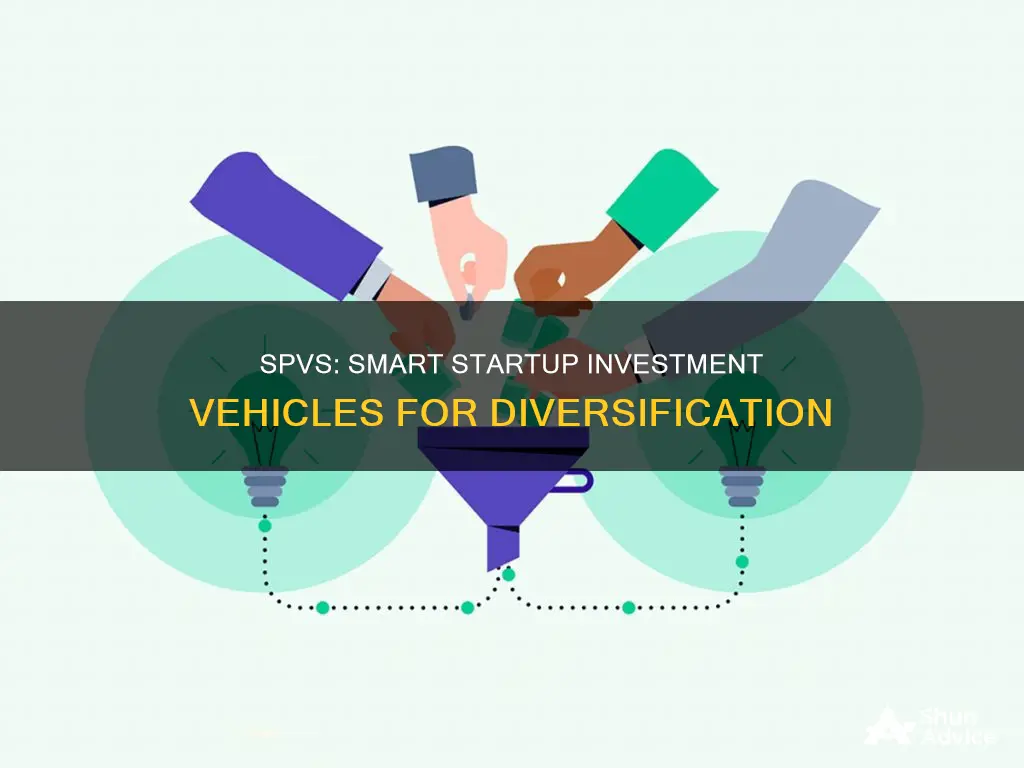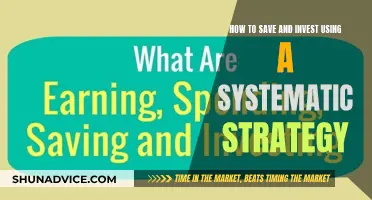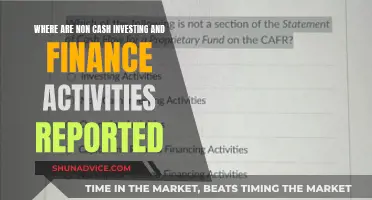
Special Purpose Vehicles (SPVs) are becoming an increasingly popular way to invest in startups. SPVs are legal entities that allow multiple investors to pool their capital and make an investment in a single company. This provides a way for investors who are new to VC, or who don't have enough capital to invest in a fund, to gain exposure to the startup economy. SPVs are also a good way to build an investment track record and learn the nuances of startup investing. They are cheaper, faster and less effort to set up than a VC fund.
| Characteristics | Values |
|---|---|
| Purpose | To pool money from a group of investors to make a single investment in a startup |
| Investment type | Single investment in one company |
| Investor type | Investors who are new to VC, or investors that don't have enough capital to invest in a fund |
| Investment minimums | Lower than funds (often as low as $1k) |
| Investor control | Investors can select the specific startup investments they're interested in |
| Legal structure | Limited liability company (LLC) or limited partnership |
| Investor involvement | Investors become "members" of the SPV and receive "membership interest" |
| Taxation | SPV is a pass-through entity, meaning investors are responsible for paying personal income taxes on any profits |
| Fees | May be subject to carry and management fees |
| Investor number limits | SEC permits a maximum of 250 accredited investors for SPVs raising $10M or less; limit is 100 investors for SPVs raising over $10M |
| Access | Easier for investors to get involved than with a traditional VC fund |
| Diversification | SPVs are not diversified as they invest in only one startup |
| Voting rights | Investors inside the SPV do not have voting or information rights |
What You'll Learn
- SPVs allow investors to pool their money together to invest in a single company
- SPVs are cheaper, faster and less effort to set up than a VC fund
- SPVs are a great way for new investors to build an investment track record
- SPVs are less expensive to set up than a VC fund
- SPVs allow investors to select the specific startup investments they’re interested in

SPVs allow investors to pool their money together to invest in a single company
Special Purpose Vehicles (SPVs) are legal entities that allow investors to pool their money and invest in a single company. SPVs are often used by investors who want to invest in a single specific company, as opposed to spreading their investment across several companies.
SPVs are typically formed as limited liability companies (LLCs) or limited partnerships. In either case, SPVs are so-called "pass-through vehicles", which are owned by their members and pass through income (or losses) to those members in proportion to each member's ownership.
SPVs are attractive to investors because they offer access to deals with lower investment minimums, typically as low as $1,000. Direct investments often have higher minimums. SPVs also allow investors to select the specific startup they want to invest in, rather than spreading their investment across several companies.
SPVs are also beneficial for startup founders as they simplify the cap table (a detailed spreadsheet that outlines all the stock owners of a company and the terms at which they have invested). Rather than listing each individual investor with the amount invested and supplying regular updates to each investor, the startup in this case would only need to add one entity to the cap table.
Direct Investing: Strategies for Personal Finance Success
You may want to see also

SPVs are cheaper, faster and less effort to set up than a VC fund
Special Purpose Vehicles (SPVs) are cheaper, faster, and less effort to set up than a VC fund. SPVs are a great way for investors to gain exposure to the startup economy and build an investment track record.
SPVs are cheaper than VC funds because they require lower investment minimums, often as low as $1,000, whereas VC funds typically require a minimum investment of $500,000. SPVs are also faster to set up because they only invest in one company, whereas VC funds invest in multiple companies, which takes more time. Additionally, SPVs are less effort to set up because they are structured as pass-through vehicles, which means they pass through income or losses to members in proportion to their ownership. This simplifies the financial structure and reduces the administrative burden.
SPVs are also more flexible than VC funds. Investors in an SPV can select the specific startup they want to invest in, whereas VC funds spread the investment across multiple companies. SPVs are commonly used by investors who want to invest in a specific company that falls outside the fund's investment thesis or when the fund doesn't have enough capital left to deploy.
Furthermore, SPVs provide a great opportunity for new investors to get started in venture capital. By raising an SPV, they can approach LPs with a specific investment opportunity and build a network of LPs interested in investing in a fund. SPVs also allow investors to gain experience in deal-by-deal investing and build relationships with GPs and their investment philosophy.
Overall, SPVs offer a more accessible, flexible, and efficient way to invest in startups compared to traditional VC funds. They are cheaper, faster, and less effort to set up, making them a popular choice for investors looking to gain exposure to the startup ecosystem.
Equity Investment's Impact on Cash Flow Statements
You may want to see also

SPVs are a great way for new investors to build an investment track record
Special Purpose Vehicles (SPVs) are a great way for new investors to build an investment track record. SPVs are legal entities that allow investors to pool their money and invest in a single company. They are commonly used by new investors to gain exposure to the startup ecosystem, learn the nuances of startup investing, and build an investment track record.
One of the main advantages of SPVs is that they typically require lower investment minimums than traditional venture capital funds, often as low as $1,000. This makes SPVs accessible to a wider range of investors who may not have the capital required for a direct investment in a private company, which can total upwards of $50,000 or more. By pooling their money together, investors in an SPV can gain access to investment opportunities that may otherwise be out of reach.
Additionally, SPVs offer investors the flexibility to select specific startup investments that align with their interests. In a traditional venture capital fund, investors may not have a say in the specific companies the fund invests in. With an SPV, investors know exactly what the investment is, providing transparency and control over their investment choices.
SPVs also allow new investors to establish a network of limited partners (LPs) who may be interested in investing in future funds. By raising an SPV and approaching LPs with a specific investment opportunity, new investors can build relationships and demonstrate their investment capabilities, which can lead to future investment opportunities.
Furthermore, SPVs are typically less expensive and faster to set up than traditional VC funds. This makes them a cost-effective option for new investors who want to build a track record before launching a full-fledged VC fund. SPV automators, such as Carta, Assure, and AngelList, have made the process of setting up an SPV more accessible and efficient.
In conclusion, SPVs provide new investors with a valuable opportunity to build an investment track record. They offer lower investment minimums, flexibility in investment choices, networking possibilities, and a more efficient and cost-effective way to gain experience in the startup investment landscape.
CDs: Cash or Investment?
You may want to see also

SPVs are less expensive to set up than a VC fund
Special Purpose Vehicles (SPVs) are less expensive to set up than a VC fund. SPVs are a more affordable option for investors who want to gain exposure to the startup economy without breaking the bank. Here's why:
Lower Investment Minimums
SPVs typically require lower investment minimums than VC funds, with some allowing investments as low as $1,000. This makes SPVs more accessible to a wider range of investors who may not have the capital required for a traditional VC fund.
Flexibility in Investment Selection
Investors in SPVs have the flexibility to select specific startup investments that align with their interests. In a VC fund, investors often don't have a say in how the fund deploys its capital. SPVs offer investors the advantage of knowing exactly where their money is going.
Simplified Structure and Lower Costs
SPVs are typically structured as limited liability companies (LLCs) or limited partnerships, which are less complex and costly to set up compared to a full-fledged VC fund. The administrative costs associated with SPVs are usually a fraction of what it takes to establish a VC fund.
Streamlined Deal-Making
SPVs are often favoured by startup founders as they simplify the process of raising capital. By pooling multiple investors' capital together, SPVs allow founders to deal with a single entity on their cap table, reducing administrative burden and keeping sensitive information within a smaller group.
Broader Investor Network
SPVs enable investors to market to a broader group of investors, including high-net-worth individuals or family offices. These investors can participate on a deal-by-deal basis without the need to source investments or conduct initial diligence themselves, making it a mutually beneficial arrangement.
SPVs offer a cost-effective way for investors to gain exposure to the startup ecosystem, providing flexibility, accessibility, and streamlined deal-making. By choosing SPVs, investors can diversify their portfolios, build a track record, and gain access to opportunities that might not be available through traditional VC funds.
Cash App Investing Tab: What You Need to Know
You may want to see also

SPVs allow investors to select the specific startup investments they’re interested in
Special Purpose Vehicles (SPVs) are legal entities that allow investors to pool their money together to invest in a single company. SPVs are often used by investors who are new to VC, or those who don't have enough capital to invest in a fund. They are a great way to gain exposure to the startup ecosystem, learn the nuances of startup investing, and build an investment track record.
SPVs typically require lower investment minimums than funds (often as low as $1,000), and they offer investors the flexibility to select the specific startup investments they're interested in. This is in contrast to traditional VC funds, where investors often don't have much of a say over how the funds are deployed.
SPVs are formed as LLCs or limited partnerships and function as pass-through vehicles, meaning they pass through income or losses to members in proportion to each member's ownership. Members of an SPV receive membership interest, typically expressed as a percentage. For example, an investor who invests $10,000 in an SPV that raises a total of $100,000 will receive a 10% membership interest in the SPV.
SPVs allow investors to have more control over their investment choices and provide an opportunity to gain experience in the startup investment space without requiring a large amount of capital.
Strategies for Shifting Investments to Cash Reserves
You may want to see also
Frequently asked questions
SPVs allow investors to pool their money together to invest in a single company. This means that investors can access deals that they would not be able to afford individually.
SPVs are cheaper, faster and less effort to set up than a VC fund. They are also more flexible, allowing investors to select the specific startup investments they’re interested in.
SPVs are not diversified because they invest in a single company. If that company fails, investors may not see any return on their capital. Investors in an SPV also don't have voting rights and are subject to the SPV terms and agreements.







